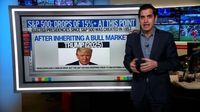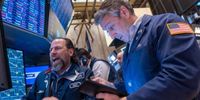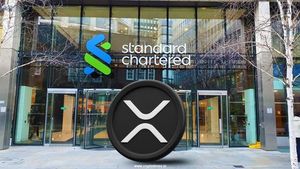Dow futures sank more than 1,500 points on Sunday evening, April 6, 2025, as fears of a 'Black Monday' loomed large over Wall Street. This dramatic decline comes on the heels of a chaotic week in the stock market, where a series of sell-offs wiped away over $5.4 trillion in market value. The Dow was down 1,531 points, or 4%, while the S&P 500 and Nasdaq-100 futures both fell by 4%, and the Russell 2000 plummeted 7%. The market turmoil is largely attributed to President Donald Trump's recent tariff announcements, which have sparked widespread concern among investors.
On Friday, April 4, the Dow experienced its worst single-day drop in years, falling by 2,231 points, marking the first time the index has recorded back-to-back losses of more than 1,500 points. The S&P 500 also suffered, tanking 6% in its worst performance since the COVID-19 pandemic, while the Nasdaq Composite lost nearly 6% on both Thursday and Friday. The rapid decline has left many investors anxious about the potential for a prolonged downturn.
Market analysts are sounding alarms, with Harvard University graduate and founder of TheStreet, Jim Cramer, warning of a potential 'Black Monday' on April 7. During his CNBC show, Mad Money, Cramer stated, “If the president doesn’t try to reach out and reward these countries and companies that play by the rules, then the 1987 scenario… the one where we went down three days and then down 22% on Monday, has the most cogency.” This reference to the infamous market crash of 1987 underscores the severity of the current situation.
The recent turmoil is closely linked to Trump's aggressive tariff regime, which has raised fears of an escalating trade war, particularly following China's retaliation on April 4, when it imposed a 34% tariff on all U.S. goods. This move has only heightened anxieties about the potential for a global economic recession. Trump defended the tariffs as "medicine" to fix the trade deficit, stating, “What’s going to happen with the market? I can’t tell you. But I can tell you, our country has gotten a lot stronger, and eventually it’ll be a country like no other.”
Despite the president's assurances, market sentiment remains bleak. The Dow closed in correction territory on April 4, down more than 10% from its record high in December, while the Nasdaq entered bear market territory for the first time since 2022, down over 20% from its peak. The S&P 500 is teetering on the edge of a bear market, having fallen 17.4% since its all-time high on February 19, 2025.
Investors are grappling with the implications of the tariffs, which analysts predict could hike taxes on Americans by $660 billion annually. The nonpartisan Tax Foundation has projected that the average American household will pay an additional $2,100 per year for goods due to the tariffs, with the average import tax surging to 19% this year, the highest rate since the Smoot-Hawley era in 1933. This significant increase is expected to drive consumer prices higher, adding 2% to the Consumer Price Index, which has struggled to stabilize in recent years.
Moreover, JPMorgan analysts have raised the risk of a recession to 60%, while Goldman Sachs has placed the probability of a recession within the next 12 months at approximately 35%. Federal Reserve Chair Jerome Powell acknowledged that Trump’s tariffs were more aggressive than anticipated and would likely slow down the economy. Powell stated that while the Fed wasn’t in a rush to act, it was closely monitoring the economic effects of the tariffs.
As the stock market braces for potential further declines, some analysts believe that the recent plunge may create buying opportunities for investors. Stocks are currently trading at a historically low price-to-earnings ratio of 15 times future earnings projections, leading some to speculate that a rebound could be on the horizon. Mark Malek, chief investment officer at Siebert Financial, remarked, “The bull market is dead. We might see some gains in the next few days, but for now, they’re not going to be sustainable.”
Meanwhile, Treasury Secretary Scott Bessent attempted to reassure the public, stating on NBC News' "Meet the Press" that there was "no reason" to anticipate a recession. However, the uncertainty surrounding the tariffs and their impact on the global economy continues to weigh heavily on investor sentiment.
In the wake of these developments, the market's future remains uncertain. Trump is scheduled to hold a press conference with Israeli Prime Minister Benjamin Netanyahu on Monday afternoon, where discussions about tariffs are expected to take center stage. Investors are eager to see if any new information or negotiations will emerge that could alleviate their concerns.
As the situation unfolds, the potential for a recovery or further decline in the markets hangs in the balance. Analysts continue to monitor the effects of Trump's tariff policies and their implications for the broader economy, with many urging caution as the markets navigate this turbulent period.
While some traders believe a market rally might be imminent, the sustainability of any gains remains in question. Alex Morris, chief investment officer at F/m Investments, noted, “We may see a day this week where screens are green, but any lasting rally may not arrive for three or four weeks.”
The coming days will be critical for investors as they seek clarity amid the turmoil and uncertainty that has dominated the markets in recent weeks.





